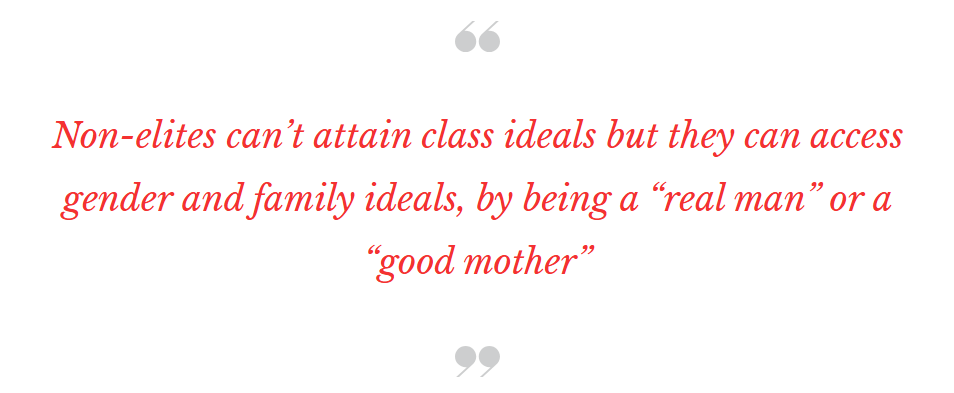Welcome to DU!
The truly grassroots left-of-center political community where regular people, not algorithms, drive the discussions and set the standards.
Join the community:
Create a free account
Support DU (and get rid of ads!):
Become a Star Member
Latest Breaking News
Editorials & Other Articles
General Discussion
The DU Lounge
All Forums
Issue Forums
Culture Forums
Alliance Forums
Region Forums
Support Forums
Help & Search
How post-materialism fuelled the rise of the far right

For mainstream parties to lure back far right voters, will new approaches to economic policy be enough? Or do they need to appreciate the cultural gap that separates the professional managerial elite from middle-status folk in routine jobs?
https://blogs.lse.ac.uk/inequalities/2025/09/03/how-post-materialism-fuelled-the-rise-of-the-far-right/


The accepted wisdom in political science is that the class divisions that defined the left and right until roughly 1970 were replaced thereafter with the rise of “post-materialism”, as cultural issues and environmentalism emerged as the key defining feature separating left from right. Ronald Inglehart originated this analysis in 1977, later joined by Pippa Norris, whose co-authored book, Cultural Backlash (2019), presents a triumphalist picture of older “authoritarian” generations with conservative cultural values being replaced by more enlightened “libertarian” generations with progressive cultural values, in a retread of the “arc of history bends towards progress” Enlightenment narrative. The only problem: that ain’t happening. In the US, younger voters have veered away from Democrats by 14 points since 2012. The far right is attracting younger men in country after country, with gender gaps among younger people yawning as large as 50 points as younger men flock to the far right. So much for the inevitable march of progress.
That’s just the first problem with the post-materialist thesis. The second is its pristine ignorance of the most important trend in sociologists’ study of class in the past half century. Pierre Bourdieu pointed out in the 1970s that class is expressed through cultural differences, most notably in Distinction: A Social Critique of the Judgement of Taste. At the time Bourdieu was writing, elites expressed their distinction from non-elites through their embrace of high-brow culture. Poor people played the blues or bluegrass and wore blue jeans. Rich people wore silk, spoke with an elevated vocabulary, and loved high-brow music, literature and art. This simple typology is long gone. Elites today wear blue jeans and tattoos and are “cultural omnivores” who embrace both high- and low-brow culture. Yet elites still insist on their embrace of “sophistication”, which is how elites signal their high social status to others in the elite. It’s just that today we define what’s sophisticated differently…
The axis of values: self-discipline vs self-development
To understand this more subtle form of class signalling, we have to appreciate that elite and non-elite status are constructed in relationship to each other. There are lots of class distinctions, of course, that matter in different contexts; I’ll focus on the distinction between the professional managerial elite and the middle-status people in routine jobs, which is what’s driving contemporary politics. Middle-status people centre self-discipline: the kind that gets you up, every day, on time, without an attitude, to your blue-, pink- and routine white-collar job as an order-taker. They also highly value the institutions that anchor self-discipline, be that religion, the military, or traditional family and gender roles. Another reason these institutions command loyalty is that they’re sources of social honour that don’t depend on one’s role in the capitalist pecking order: non-elites can’t attain class ideals but they can access gender and family ideals, by being a “real man” or a “good mother.”

Middle-status people are very rooted, for reasons that again are related both to economics and to status. Whereas elites’ human capital is portable – I can show up in Britain or Korea and be introduced as a Distinguished Professor – someone who sells kitchen appliances may stay closer to home, near people who know he’s a person of substance, not just the freezer guy. Rootedness is also at play when non-elites depend on family and “people they’ve known forever” for childcare and elder care, or help fixing the car or the roof – things elites pay someone to do. (Note, then, that it’s not just non-elites’ relationship to the means of production that constitutes the economic dimension of class.) Finally, everyone stresses the categories that give them honour, so non-elites are more patriotic than elites: being American or British (and so on) is one of the only high-status memberships non-elites can claim.
snip